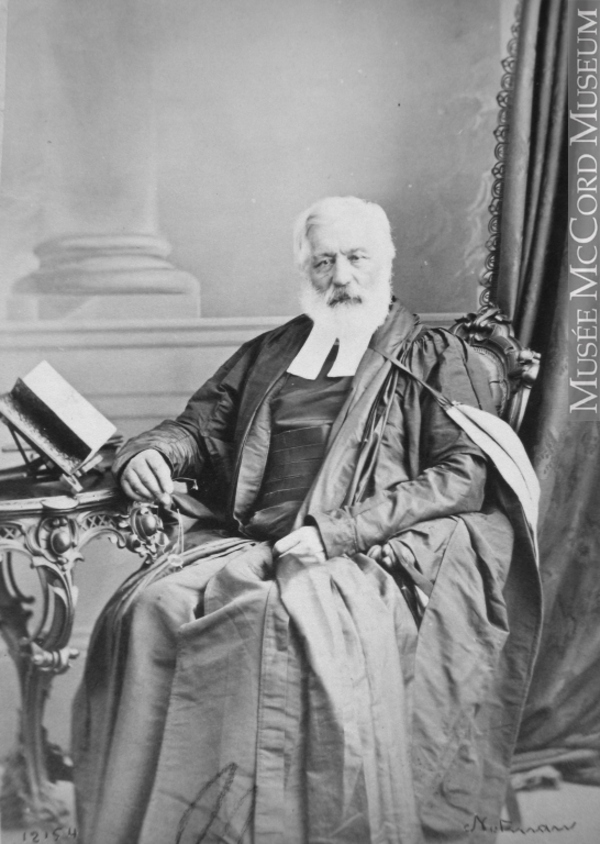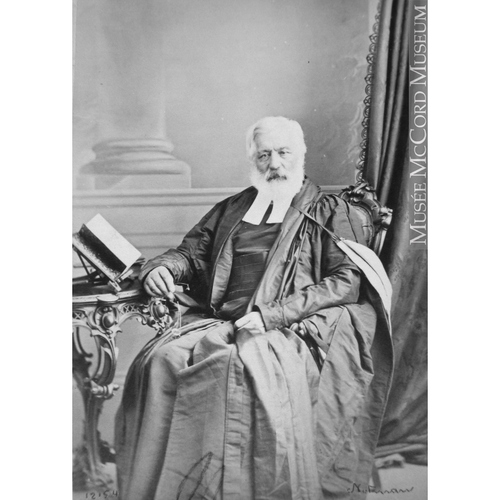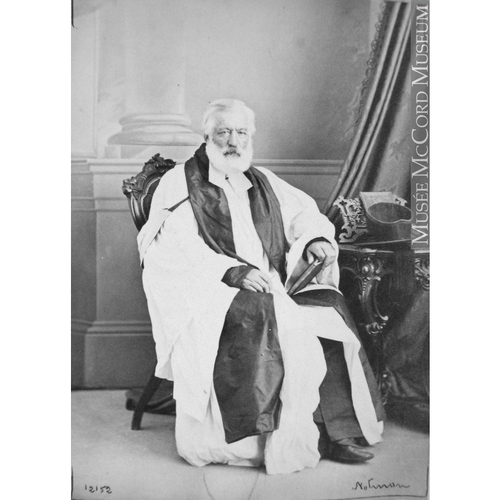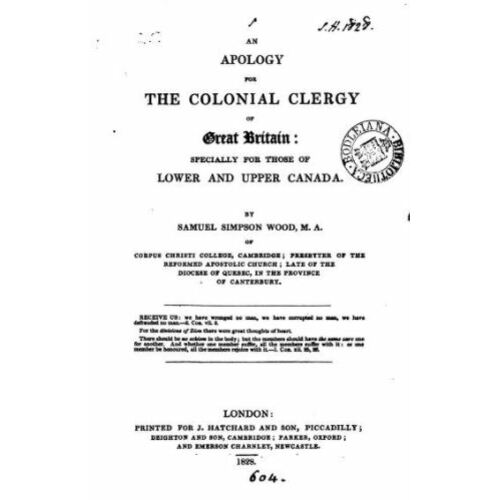
Source: Link
WOOD, SAMUEL SIMPSON, Church of England minister and educator; b. 21 Feb. 1795 in Bideford, England, son of Captain Samuel Wood; d. 25 March 1868 in Upper Durham (Kirkdale), Que.
Samuel Simpson Wood was educated at James Tate’s Richmond Grammar School before taking his ba in 1818 at Corpus Christi College, Cambridge. In 1819 Jacob Mountain*, first Church of England bishop of Quebec, engaged him as missionary of the Society for the Propagation of the Gospel and on 8 Nov. 1819 appointed him to Drummondville, where he established a church. He was appointed rector of St James’ Church at Trois-Rivières in 1827 but was not inducted until January 1829. He remained in this parish until 1856, when he returned to the Drummondville area at Upper Durham (1856–68). From 1857 to 1863 he was also rural dean for much of the southeastern region of Canada East. In 1834 Wood had married Margaret Mary Hallowell, a cousin of John* and Alexander Neil Bethune*; eight of Wood’s 12 children survived him.
In 1827–28, Wood was in England and took his ma at Cambridge. He also published An apology for the colonial clergy of Great Britain: specially for those of Lower and Upper Canada, an attack on the Colonial Clergy Act of 1819 which prevented clergymen ordained by colonial bishops from discharging the duties of priest in an ecclesiastical province in England except with the special permission of the archbishop of that province. The work briefly describes the problems Church of England clergymen faced in Canada, particularly respecting Catholics and Dissenters. It also treats such questions as the clergy reserves and the necessity for professors of the University of King’s College at York (Toronto) to be clergy of the Church of England. The pamphlet is interesting as a reflection of a conservative Anglican mind. Wood returned to England in 1834 charged by Bishop Charles James Stewart* with arguing the case for stopping the sale of clergy reserves land and placing their management in the hands of the Church of England instead of a government board. Wood was also charged with directing a fund-raising campaign for Upper Canadian missions, getting the appointment of a suffragan bishop for Lower Canada, and securing amendments to the charter of McGill University permitting it to expand at will. In all these efforts he failed, although he did get the SPG to establish the basis of an episcopal library for the diocese of Quebec, which at that time included Upper Canada.
As a participant in the clergy reserves controversy and in the formation of the first Synod of the Diocese of Quebec (1859) and as one of the founders of the Church Society (1842), Wood shared in the difficult transition of the Church of England from an English state-supported institution to a more indigenous, voluntary church. He was among the vice-presidents of the Church Society from 1845 to his death. In 1858–59 he defended George Jehoshaphat Mountain in a controversy with evangelical churchmen over the voting system in the diocesan synod, in which the bishop tried to ensure that clergymen would have a predominant voice over lay members.
Wood was particularly eminent as an educator. He complained of the American influence on education exerted through American textbooks used even in government schools, and urged the establishment of “National Schools.” In Trois-Rivières and Drummondville he established grammar schools, whose curriculum indicated the profound influence of Tate; they were to educate a colonial élite, and they tutored, among others, the sons of Chief Justice Sir James Stuart* and Sir John Colborne. In 1833 Wood was offered the principalship of McGill University, but declined because of its public duties. Having long tutored theology students, he was asked in 1840 to be principal of Bishop’s College at Trois-Rivières but again declined when in 1843 it was established instead at Lennoxville. A contemporary described Wood as having “the true notion of education; a devout Christian, a consistent Churchman, and a genuine English gentleman himself, he aimed at making his pupils the same.”
Well balanced, possessed of above average intelligence and a sense of humour, Wood was a persuasive and popular minister. Through his friendships with Charles James Stewart and particularly George Jehoshaphat Mountain, who shared his tastes and ideas, Wood’s opinion, though rarely publicized, was well respected in the church, but his fear of publicity prevented his fulfilling their expectations. Himself a forgotten notable, his life and thought remain representative of the Anglican clergy of his time.
S. S. Wood, An apology for the colonial clergy of Great Britain: specially for those of Lower and Upper Canada (London, 1828). Anglican Church of Canada, Diocese of Montreal, Synod Archives (Montreal), Letters and papers of George Jehoshaphat Mountain, 19, 23 Dec. 1833; 2 Jan., 26 Feb. 1834; 8 Aug. 1835. Church House Archives (Quebec), Diocese of Quebec, Minutes of the meetings of the Central Board of the Church Society of the diocese of Quebec, 1854–68. McGill University Archives (Montreal), Bills, invoices, and miscellaneous documents, 1821–39, 9 May, 2 July 1834; 20, 22 July, 8 Aug., 18 Nov. 1835. PAC, MG 24, A40, 1, p.208. PRO, CO 42/260, pp.711–12 (mfm. at PAC). QDA, 50 (B-4), pp.2–29, 42; 70 (B-24), pp.46–47, 49–50, 66–106, 108–9; 81 (C-10), p.65; 94 (D-13), 6, 30 Aug. 1834; 30 Jan., 2 Feb., 19 May, 28 Dec. 1835; 97 (D-16), 7, 22 April, 28 Aug. 1841; 16 Feb., 27 May, 26 July 1842; 114 (G-8), pp.18–28; 122 (G-16), p.25; 124, case 2, folder 13, p.3. USPG, C/CAN/Que., IV, 31, f.368; 33, f.370; 34, ff.370, 375; Journal of SPG, 32, pp.73, 110, 326 (mfm. at PAC).
“Address to the Rev. S. S. Wood, from the inhabitants of Drummondville and its vicinity,” Christian Sentinel, and Anglo-Canadian Churchman’s Magazine (Montreal), I (1827), 48–50. Church of England, Diocese of Quebec, Proc. of the Diocesan Assembly (Quebec), 1854, 4; Report of the proceedings of the meetings of the bishop, clergy and laity . . . 24th June, 1858 . . . (Quebec, 1859), 7–8, 11. Berean (Quebec), 3 July 1845, 9 July 1846, 8 July 1847, 13 July 1848. Canadian Ecclesiastical Gazette (Quebec), 18 July 1850; 14 Aug., 11 Sept. 1851; 1 March 1853. A. E. E. Legge, The Anglican Church in Three Rivers, Quebec, 1768–1956 ([Russell, Ont.], 1956). Millman, Life of Charles James Stewart. “The late Rev. S. S. Wood,” Lennoxville Magazine (Montreal), I (1868), 204–11. D. C. Masters, “G. J. Mountain,” CHA Report, 1963, 89–101. A. J. Oakley, “Centenary biography: the Reverend Samuel Simpson Wood,” Quebec Diocesan Gazette, XLIX (1942), 26–29. “A pioneer clergyman of Quebec diocese,” Canadian Church Magazine and Mission News (Hamilton, Ont.), IV (1890), 80.
Cite This Article
James H. Lambert, “WOOD, SAMUEL SIMPSON,” in Dictionary of Canadian Biography, vol. 9, University of Toronto/Université Laval, 2003–, accessed April 25, 2025, https://www.biographi.ca/en/bio/wood_samuel_simpson_9E.html.
The citation above shows the format for footnotes and endnotes according to the Chicago manual of style (16th edition). Information to be used in other citation formats:
| Permalink: | https://www.biographi.ca/en/bio/wood_samuel_simpson_9E.html |
| Author of Article: | James H. Lambert |
| Title of Article: | WOOD, SAMUEL SIMPSON |
| Publication Name: | Dictionary of Canadian Biography, vol. 9 |
| Publisher: | University of Toronto/Université Laval |
| Year of revision: | 1976 |
| Access Date: | April 25, 2025 |





